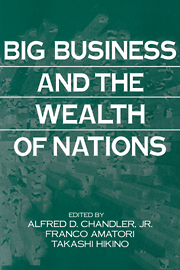Book contents
- Frontmatter
- Contents
- Acknowledgments
- List of tables and figures
- List of contributors
- Part I Overview
- Part II National experiences of big business
- 3 The United States: Engines of economic growth in the capital-intensive and knowledge-intensive industries
- 4 Great Britain: Big business, management, and competitiveness in twentieth-century Britain
- 5 Germany: Competition abroad – cooperation at home, 1870–1990
- 6 Small European nations: Cooperative capitalism in the twentieth century
- 7 France: The relatively slow development of big business in the twentieth century
- 8 Italy: The tormented rise of organizational capabilities between government and families
- 9 Spain: Big manufacturing firms between state and market, 1917–1990
- 10 Japan: Increasing organizational capabilities of large industrial enterprises, 1880s–1980s
- 11 South Korea: Enterprising groups and entrepreneurial government
- 12 Argentina: Industrial growth and enterprise organization, 1880s–1980s
- 13 USSR: Large enterprises in the USSR – the functional disorder
- 14 Czechoslovakia: The halting pace to scope and scale
- Part III Economic and institutional environment of big business
- Index of company names
- General index
11 - South Korea: Enterprising groups and entrepreneurial government
Published online by Cambridge University Press: 04 May 2010
- Frontmatter
- Contents
- Acknowledgments
- List of tables and figures
- List of contributors
- Part I Overview
- Part II National experiences of big business
- 3 The United States: Engines of economic growth in the capital-intensive and knowledge-intensive industries
- 4 Great Britain: Big business, management, and competitiveness in twentieth-century Britain
- 5 Germany: Competition abroad – cooperation at home, 1870–1990
- 6 Small European nations: Cooperative capitalism in the twentieth century
- 7 France: The relatively slow development of big business in the twentieth century
- 8 Italy: The tormented rise of organizational capabilities between government and families
- 9 Spain: Big manufacturing firms between state and market, 1917–1990
- 10 Japan: Increasing organizational capabilities of large industrial enterprises, 1880s–1980s
- 11 South Korea: Enterprising groups and entrepreneurial government
- 12 Argentina: Industrial growth and enterprise organization, 1880s–1980s
- 13 USSR: Large enterprises in the USSR – the functional disorder
- 14 Czechoslovakia: The halting pace to scope and scale
- Part III Economic and institutional environment of big business
- Index of company names
- General index
Summary
INDUSTRIALIZATION THROUGH LEARNING
At the heart of South Korea's industrial transformation has been the family-controlled, diversified big business group, or chaebol. The enterprise system that is centered around the chaebol, which I call state entrepreneurial capitalism, has differed from the established classifications of modern enterprise systems, such as the personal capitalism of Britain, the competitive managerial capitalism of the United States, or the cooperative managerial capitalism of Germany. Korea's enterprise system most closely resembles that of Japan's prewar zaibatsu, and both enterprise systems are part of a more general “late”-industrializing paradigm. But Korea's enterprise system differs from that of Japan insofar as the chaebol were denied their own banking affiliates by a state-owned banking system. This accorded the government through its credit allocation far more power over the process of industrialization and the policies of big business than was characteristic even of Japan.
With Japan's “demonstration effect” – which showed that it was possible for a backward country to industrialize – the Korean government staked its own survival on economic growth rather than cronyism, and used its power to promote systematic capital accumulation through savings and investment. It not only supported big business but also disciplined it by exacting performance standards in exchange for various subsidies, such as preferential credit and protection from foreign imports and investments. Political loyalty was a necessary but not sufficient condition for receiving lucrative incentives. If a targeted firm proved itself to be a poor performer, it ceased being subsidized – as evidenced by the high turnover among Korea's top-ten companies between 1965 and 1985.
- Type
- Chapter
- Information
- Big Business and the Wealth of Nations , pp. 336 - 367Publisher: Cambridge University PressPrint publication year: 1997
- 21
- Cited by

